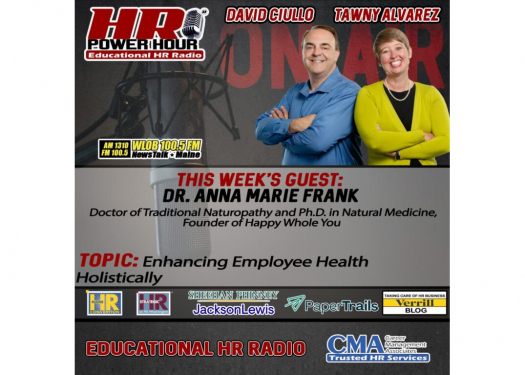NCCI Maine Advisory Forum 2018
 On Thursday, March 22, 2018, Attorney Beth Smith attended the morning session of the National Council of Compensation Insurance (NCCI) State Advisory Forum for Maine, held in Portland, Maine. Justin Moulton and Jim Davis hosted on behalf of NCCI, and there were roughly thirty attendees.
On Thursday, March 22, 2018, Attorney Beth Smith attended the morning session of the National Council of Compensation Insurance (NCCI) State Advisory Forum for Maine, held in Portland, Maine. Justin Moulton and Jim Davis hosted on behalf of NCCI, and there were roughly thirty attendees.
The session opened with a short video featuring Bill Donnell, President and CEO of NCCI, where he introduced the "word" for 2018: Adapting. Mr. Donnell explained that change is coming to the national workers' compensation industry and to survive, stakeholders in the industry are going to have to adapt. He emphasized the growing impact of automation and the gig-economy on workers' compensation, and the link between employers' need to adapt to remain competitive and the industry's need to adapt to keep up with technology in support of the Grand Bargain. All of these points are relevant in Maine.
Next, Jim Davis led the audience through national trends and statistics, including flat premiums after five years of growth, a decline in frequency of claims, and medical and indemnity claims severity increasing slightly.
The highlight for this author, however, was the session led by Executive Director Sighinolfi in which he described some of the more interesting proposed changes to the Maine Workers' Compensation Board Rules and Regulations. A taskforce including Board staff and representatives of business, labor and insurance companies have been working since August of 2016 on the first major overhaul of the Rules in years. Some of the proposed Rules are the direct result of negotiation between the stakeholders; some were simply pet projects of Executive Director Sighinolfi. Executive Director Sighinolfi plans to present the proposed new Rules and revisions to existing Rules to the Board at the April 3, 2018 meeting, to begin the process toward adoption. While the intent of the proposed Rules is to increase efficiency in the system, there are several proposals that employers should review in order to determine how the proposed Rules, if enacted, might affect their business in advance of the comment period.
One such rule will require employers to file a First Report of Injury within seven days of notice or knowledge of an injury that requires only medical treatment, but no lost time. Known as a "med-only" claim, these claims presently require an employer to complete a First Report of Injury, but an employer has no obligation to file the FROI with the Board unless or until the employee misses time from work. The stated idea behind this proposal is to eliminate so-called "orphan medical bills," or medical bills where there has been no reported injury, so claims adjusters are not willing to pay the bill. The risk this author sees is the potential for a drastic increase in non-occupational conditions being brought into the workplace via medical treatment for chronic conditions. While that is already an issue in Maine due to high-deductible health insurance plans and an aging workforce, this Rule may exacerbate the problem, so employers should consider whether such a comment may be appropriate, once the Board opens the comment period.
Another interesting proposal addresses situations where an employee, receiving lost time benefits, is released to return to work without restrictions or limitations due to the injury by the employee's treating health care provider, there are no conflicting medical records, but instead of returning to work, the employee receives vacation pay, PTO or holiday pay. In that instance, no benefits are due, since the employee is no longer "incapacitated". This author has not encountered this situation, but it does seem to be a valid clarification of an employee's right to return to work, balanced by the employer's obligation to return that recovered employee to work.
A proposed Rule receiving some attention from the defense bar will allow employees receiving indemnity benefits to also receive holiday and vacation pay in the same week that indemnity benefits are due with no offset for these two categories of "wages." Sick time benefits will be subject to an offset against workers' compensation benefits, but if the employer's policies group all benefits into "paid time off" or PTO, only 25% of any such benefit is liable to offset against workers' compensation benefits. Executive Director Sighinolfi's thinking is that it is discriminatory not to allow an employee to receive paid vacation or holiday pay just because they happen to be receiving indemnity due to a work injury. This seems to be counter-intuitive to the principle of wage replacement, but as this was a hard-negotiated compromise, it is not likely to change regardless of comments from the business community.
Finally, a proposed Rule will require that employers and insurers produce all surveillance evidence obtained since the injury or since the last decree, whichever period is shorter, regardless of whether the employer/insurer intends to attempt to introduce any of the surveillance into evidence. Additionally, this proposal will require the defense attorney to file an affirmation that all surveillance has been provided to opposing counsel. It is not clear what might be captured in the definition of "surveillance" so social media sweeps may be subject to this type of disclosure, even when they produce virtually no information. According to Executive Director Sighinolfi, certain employers were producing edited surveillance without revealing that the surveillance video had been edited to show only activity, but not periods of inactivity. This argument seems spurious, since failing to capture an employee working around the yard does not always mean that the employee is inactive due to medical limitations related to the work injury. Some employees are skilled at avoiding notice for various reasons, but they are not necessarily housebound on the couch. In any event, as an industry, this proposed Rule may change the way long-term, high cost cases are managed in litigation.
As a parting thought, Maine's economy is booming, with a 2.9% unemployment rate for February just announced by Governor LePage's office. As Executive Director Sighinolfi noted, everyone should be able to find a job in this economy, which should be welcome news to recovering workers attempting to return to the labor market.
For more information on recent developments in labor, employment and workers' compensation law, please contact a member of Verrill Dana's Labor and Employment Practice Group.



















